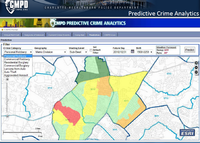-
More law enforcement agencies refuse to hold undocumented inmates for ICE
Recent court rulings have emboldened roughly 225 law enforcement agencies across the country to refuse requests from Immigration and Customs Enforcement(ICE) officials to hold undocumented inmates past their release dates so federal authorities can have time to deport them. Until recently, inmates suspected of being in the country illegally were held for an additional forty-eight hours until ICE agents arrived. Some municipalities began limiting the number of holds a few years ago, but several counties and cities have begun to ignore the requests all together after recent court rulings confirmed that the immigration holds are not mandatory.
-
-
Nanoparticles will allow detecting previously undetectable fingermarks
A group of researchers from Switzerland has thrown light on the precise mechanisms responsible for the impressive ability of nanoparticles to detect fingermarks left at crime scenes. The researchers have provided evidence contesting the commonly accepted theory that nanoparticles are attracted to fingermarks electrostatically. The attraction, they claim, is in fact chemical and is caused by compounds on the surface of nanoparticles bonding with a complex cocktail of compounds present in fingermark residue.
-
-
Experts urge caution in relying upon eyewitness identifications in criminal cases
A new report from the National Research Council recommends best practices that law enforcement agencies and courts should follow to improve the likelihood that eyewitness identifications used in criminal cases will be accurate. Science has provided an increasingly clear picture of the inherent limits in human visual perception and memory that can lead to errors, as well as the ways unintentional cues during law enforcement processes can compromise eyewitness identifications, the report says.
-
-
In U.S. criminal courts, non-citizens face harsher sentencing than citizens

Non-Americans in the U.S. federal court system are more likely to be sentenced to prison and for longer terms compared to U.S. citizens, according to a new study. The researchers analyzed U.S. federal district court data from 1992 to 2008 for this study. In 2008, for example, 96 percent of convicted non-citizens received a prison sentence, compared to 85 percent of U.S. citizens. The researchers said that the issue of punishment disparities between citizens and non-citizens is a growing concern as the number of non-citizens in the United States — estimated at more than twenty-two million — continues to grow.
-
-
Law enforcement agencies use technology to compensate for shrinking budgets
With funding shrinking in many sectors of law enforcement, agencies are searching for new ways to operate affordably while maintaining quality standards.Police departments’ budgets quadrupled between 1982 and 2006. With federal budgets shrining, there are simply too many challenges which would not allow for police budgeting-as-usual.
-
-
Investigative genetics technology helps nab criminals
Every year, investigators collect tens of thousands of biological samples from crime scenes that may hold valuable clues to solving criminal cases. Unlocking those clues now is easier thanks to a new software solution unveiled last week by Battelle researchers who have applied advanced bioinformatics to next-generation sequencing data. ExactID analyzes biomarkers that can predict physical appearance, ancestry, clinical traits, and familial relationships among people. This information can be invaluable to forensic analyses and case work.
-
-
New DOJ pilot program aims to deter Americans from joining terrorist groups
Boston, Los Angeles, and Minneapolis will host the Justice Department’s (DOJ) pilot program aimed at deterring Americans from joining terrorists groups, particularly those fighting in Syria and Iraq under the Islamic State (IS) and Somalia under al-Qaeda-affiliated al-Shabaab. The program will rely on prevention and intervention initiatives.
-
-
More police departments adopt predictive policing

More police departments have adopted data analytics as a way to combat urban crime. Supporters of the approach, also referred to as predictive policing, say that if it is used in conjunction with existing policing techniques, such as community policing, it could have a drastic impact on crime. Some note, however, that the predictive policing methodology is more useful for its general tactical utility rather than the accuracy of its predictions.
-
-
Requiring background checks for all gun sales would improve safety: Expert
Given the U.S. Supreme Court’s majority stance against efforts to regulate gun availability and ownership, many policies aimed at lessening gun violence have had at best a minimal impact, according to a new study by a University of Virginia criminologist. One policy not used in Virginia and thirty-three other states, however, would clearly make it more difficult for criminals or unqualified users to obtain guns: requiring a background check for anyone buying from an unlicensed private seller, including those at gun shows and flea markets.
-
-
W.Va. dealing with a growing threat from sovereign citizen movement members

The FBI classifies some sovereign citizens as terrorists. U.S. law enforcement officials are being warned about members of the sovereign citizen movement — the number one potential terrorist threat in the United States according to a 2014 study by the National Consortium for the Study of Terrorism and Responses to Terrorism(START). Law enforcement agencies estimate that there are about 100,000 hard-core members of various sovereign citizens groups around the country, with another 200,000 sympathizers. West Virginia police
-
-
U.S. launches campaign to combat recruitment of young Americans by militant groups

The White House, Justice Department (DOJ), DHS, and the National Counterterrorism Center have formed an alliance to combat the recruitment of young Americans to join militant groups like the Islamic State (IS) and Somali-based al-Shabaab.Officials have not released details on the network of community partnerships but local law enforcement officials, religious leaders, teachers, mental health professionals, and parents are expected to help monitor at-risk youths.
-
-
NYC mayor de Blasio facing criticism for curbing counterterrorism programs
New York City mayor Bill de Blasio is facing backlash over his decision to curb several counterterrorism programs introduced by former mayor Michael Bloomberg. Among other things, de Blasio has restricted the NYPD’s stop-and-frisk program; approved issuing municipal IDs of standards lower than those mandated by the federal government’s RealID program; is refusing to reinstate a special surveillance program which targeted Muslim communities in New York; and has also replaced the highly regarded deputy police commissioner for intelligence.
-
-
Report on CBP agent border shooting: “Police don’t get to shoot someone in the back because they beat you up”

A new, detailed report provides an in-depth look into a border shooting involving a CBP agent. Juan Mendez Jr., 18, an American citizen, was shot twice by Agent Taylor Poitevent and died at the scene. Following an investigation, Poitevent was not charged with any violations in the shooting death of Mendez. To date there are more than forty border fatalities involving CBP agents since 2005 which have remained virtually closed to public scrutiny. Thomas Herrera, former Maverick County, Texas sheriff, remains doubtful of Poitevent’s innocence. “Resisting arrest does not give an officer the right to kill someone,” Herrera said.
-
-
Counter-ISIS campaign must include a robust effort to stop Westerners from joining it: Experts

President Barack Obama last night outlined a 4-step strategy to defeat the Islamic State (IS). Administration officials indicated that the campaign against IS might take up to three years. Counterterrorism experts say that while the United States and its allies engage IS militarily, they must address the growing threat of young radicalized Western Muslims, many of whom have traveled to join the terrorist organization in Syria or Iraq.
-
-
U.S. air marshal in quarantine after suspected Ebola syringe attack at Lagos airport

An American federal air marshal was placed in quarantine in Houston, Texas yesterday after being attacked Sunday night at the Lagos, Nigeria airport. The assailant wielded a syringe which contained an unknown substance, and was able to inject an unknown substance into the back of one of the air marshal’s arms. The marshal was able to board the United Airlines flight to Houston, where he was met by FBI agents and health workers from the Centers for Disease Control (CDC).
-
- All
- Regional
- Water
- Biometrics
- Borders/Immig
- Business
- Cybersecurity
- Detection
- Disasters
- Government
- Infrastructure
- International
- Public health
- Public Safety
- Communication interoperabillity
- Emergency services
- Emergency medical services
- Fire
- First response
- IEDs
- Law Enforcement
- Law Enforcement Technology
- Military technology
- Nonlethal weapons
- Nuclear weapons
- Personal protection equipment
- Police
- Notification /alert systems
- Situational awareness
- Weapons systems
- Sci-Tech
- Sector Reports
- Surveillance
- Transportation
Advertising & Marketing: advertise@newswirepubs.com
Editorial: editor@newswirepubs.com
General: info@newswirepubs.com
2010-2011 © News Wire Publications, LLC News Wire Publications, LLC
220 Old Country Road | Suite 200 | Mineola | New York | 11501
Permissions and Policies
Editorial: editor@newswirepubs.com
General: info@newswirepubs.com
2010-2011 © News Wire Publications, LLC News Wire Publications, LLC
220 Old Country Road | Suite 200 | Mineola | New York | 11501
Permissions and Policies
